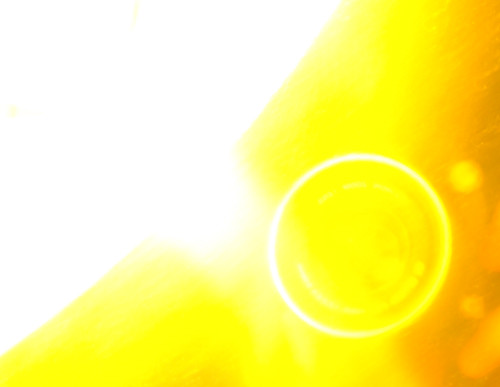A realization came to me this morning while I was listening to God through my morning devotional books, that enhanced my understanding of this verse. I have often quietly puzzled over this statement. It makes it seem on the surface that God gave the law to accelerate sin or even create more sin, which on its face seems counter-productive. But some ideas from the two devotional books acted like catalysts this morning to shed more light on this verse.
In fact, that was the essence of the thought – light. The law is nothing more than a severely condensed, left-brain statement of the character of God. As such, it was like a powerful light that was switched on in a very dark room that had filled with rats, snakes and all sorts of other revolting evils that thrive in the dark. As a primarily intellectual, factual revelation of God, the Law was a light that suddenly exposed or highlighted the many sins in the world that had thrived and multiplied since the first sin of Adam.
thrived and multiplied since the first sin of Adam.
Paul says that “before the law was given, sin was in the world. But sin is not taken into account when there is no law. Nevertheless, death reigned from the time of Adam to the time of Moses, even over those who did not sin by breaking a command, as did Adam, who was a pattern of the one to come.” (Romans 5:13-14 NIV) “Breaking a command” is the favorite technical definition for sin given by those who insist on religion and righteousness being externally and behaviorally oriented. “Whosoever committeth sin transgresseth also the law: for sin is the transgression of the law.” (1 John 3:4 KJV) I know, I was raised that way very carefully. It is also the natural human condition to view sin or righteousness as external issues of behavior.
That is where the implied question arises in Paul's statement here. He too was intensely trained in the external-oriented mode of left-brained, behavior-based religion so he knew the arguments that his words would arouse. “If you never specifically told me not to do it, then why are you getting me in trouble for it?” Have you ever heard that reasoning before? That is the logic of an immature child who is learning the nuances of how to play the externalism game. If he learns it well it will help keep him in a state of permanent immaturity for the rest of his life.
Paul points out that the symptom, the evidence that sin is present, which is death, was plainly evident even though the legalistic external commands were not obvious between Adam's time and the event at Mount Sinai. The only thing the Law really did was switch on the bright light and as a result all the existing sin became much more exposed. But where God is present there is grace, for He has never changed, and His character also is full of mercy and grace. The people in the Old Testament had to be saved exactly the same way the people under the New Covenant have to be saved – by grace alone. God provided more than enough grace for them to have, but, like too many of us yet today, most of them failed to realize that their only hope was embracing their hopelessness and throwing themselves into the grace that was waiting for them in the heart of their Creator.
The whole span of the Old Testament/Old Covenant was a period of immaturity where God had to relate to the world and His chosen children as a father has to relate to the very immature reasoning of a rebellious child. They were so stuck on defining right and wrong in terms of externals that He had to switch on a bright light to explicitly show them how out of sync they were with the ideals, character and heart of their God. The Law was not designed to save them but to expose their desperate condition and stimulate them to realize their helpless condition and cry out for mercy. Instead, they cried out with promises of obedience which plunged them into centuries of exploring every attempt to achieve righteousness and earn favor with God imaginable. Of course that is impossible – sinful humans cannot become like God by trying harder no matter how intense their desires are or how sincere their motives.
 Nothing has changed in that regard. Most of us are still attempting in some way or another to help God out by working on changing our lives so we can somehow motivate Him to do something for us or answer our prayers etc. Jesus revealed that mentality in the heart of the debtor who, instead of asking for and receiving mercy in the face of a ludicrously impossible debt, took the course of promising to pay it off somehow if he was just given enough time. (Matt. 18:23-26) If you look carefully at the size of his debt, any reasonable person would realize the absurdity of his promise. The debt amounted to 150,000 YEARS of wages for the average man. Given enough TIME? Just how much eternal life can you generate on your own to pay off that kind of debt anyway? But his subsequent actions demonstrated that, indeed he fully intended to launch into his grand project of paying off his debt so he could sing, “I did it my way”.
Nothing has changed in that regard. Most of us are still attempting in some way or another to help God out by working on changing our lives so we can somehow motivate Him to do something for us or answer our prayers etc. Jesus revealed that mentality in the heart of the debtor who, instead of asking for and receiving mercy in the face of a ludicrously impossible debt, took the course of promising to pay it off somehow if he was just given enough time. (Matt. 18:23-26) If you look carefully at the size of his debt, any reasonable person would realize the absurdity of his promise. The debt amounted to 150,000 YEARS of wages for the average man. Given enough TIME? Just how much eternal life can you generate on your own to pay off that kind of debt anyway? But his subsequent actions demonstrated that, indeed he fully intended to launch into his grand project of paying off his debt so he could sing, “I did it my way”.
What I realized this morning is that in a sense, a very similar event happened in the New Covenant as what happened at Mount Sinai. Jesus is a perfect revelation of the Father; He is the character of God personified. He repeatedly referred to Himself as the Light of the World. "The true light, which enlightens everyone, was coming into the world." (John 1:9 NRSV) As a light He exposed the intensity and vileness of the sin that had filled the whole world in spite of the light from the Law given at Sinai. But there was a big difference with this Light. For Jesus was not just a left-brain explanation of God's character written in words (left-brain only function) on hard tables of lifeless stone. He was a demonstration, an example (right-brain function of imitation) of what God looks like in attitude and relationships and feelings. He came to expose the real wickedness and helpless condition of our hearts, not just our actions and words.
The light that blazed in the world through the perfect life of Jesus was not primarily to show us what perfect behavior looks like but how to live a life from our heart in total dependence on another Source for everything. Jesus was a much brighter light than the Law because He demonstrated and taught how impossibly great the chasm really is between us and God's perfect character. We must not make the same mistake that the Children of Israel did at Mount Sinai and promise that we will try harder and be obedient. In His teachings Jesus raised the bar of perfection so high that when we realize the truth in what He said we will fall into hopelessness – which is exactly where God wants to meet us.
If Jesus had just come and lived a perfect life and gone back to heaven without dying on the cross for our sins, He would have not done anything much different than what happened at Mount Sinai, only the results would have been much worse. We need much more than an explanation of what God is like and even much more than a living demonstration of what He is like, as helpful as those are. What we must come to realize is that we need to become swallowed up in Christ by dying to ourselves in hopeless despair and throwing ourselves constantly into His grace and mercy. One reason Jesus came was to make us despair of ourselves, for it is only in total despair that we become ready to trust fully in Jesus to save us whatever that involves.
 The Light keeps getting brighter; the glory will soon fill the whole earth. (Rev. 18:1) The intensity of God's passion, the fire in His bones, His intense desire to be close to us and have us with Him for eternity – this consuming fire will either ignite our reflected passion for Him and draw us closer to Him as we allow our sin to be consumed in its invading presence, or it will harden our hearts like Pharaoh and we will ultimately be baked to extinction by the very love we rejected. We cannot blame the light for the rats and snakes. The only thing the light does is reveal reality. And likewise we cannot blame the passionate love that God has for us for the ultimate destruction of the lost. But as the light and heat intensify, we are all forced to choose which side we will live on, which view of reality we will embrace, which master we will present ourself to in loyalty and service. (Romans 6) Our choice is the only thing we have in freedom and everyone will exercise it one way or the other.
The Light keeps getting brighter; the glory will soon fill the whole earth. (Rev. 18:1) The intensity of God's passion, the fire in His bones, His intense desire to be close to us and have us with Him for eternity – this consuming fire will either ignite our reflected passion for Him and draw us closer to Him as we allow our sin to be consumed in its invading presence, or it will harden our hearts like Pharaoh and we will ultimately be baked to extinction by the very love we rejected. We cannot blame the light for the rats and snakes. The only thing the light does is reveal reality. And likewise we cannot blame the passionate love that God has for us for the ultimate destruction of the lost. But as the light and heat intensify, we are all forced to choose which side we will live on, which view of reality we will embrace, which master we will present ourself to in loyalty and service. (Romans 6) Our choice is the only thing we have in freedom and everyone will exercise it one way or the other.
Elijah then came near to all the people, and said, "How long will you go limping with two different opinions? If the LORD is God, follow him; but if Baal, then follow him." The people did not answer him a word. (1 Kings 18:21 NRSV)
He must believe and not doubt, because he who doubts is like a wave of the sea, blown and tossed by the wind. That man should not think he will receive anything from the Lord; he is a double-minded man, unstable in all he does. (James 1:6-8 NIV)
See, I am sending you Elijah the prophet before the day of the Lord comes, that great day, greatly to be feared. And by him the hearts of fathers will be turned to their children, and the hearts of children to their fathers; for fear that I may come and put the earth under a curse. (Malachi 4:5-6 BBE)





